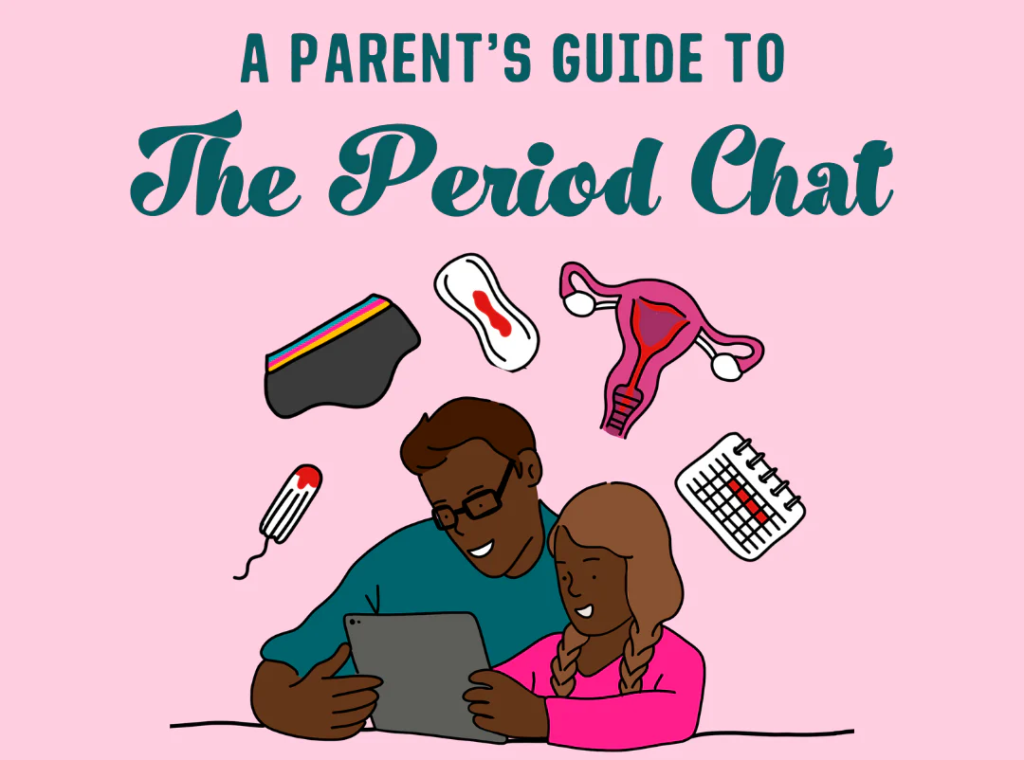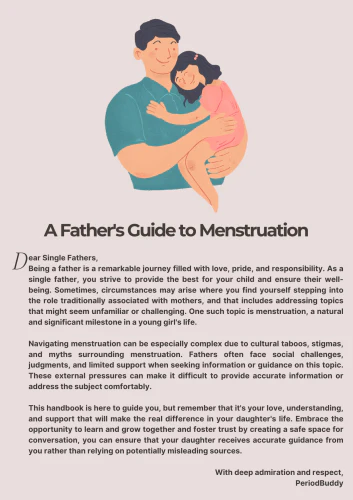A Parent’s Guide: Navigating Periods with

As parents, we witness our children’s transformation from adorable little beings into confident young adults. One of the significant milestones in this journey is the onset of puberty, including the arrival of periods for our daughters. While it may feel overwhelming or even a bit intimidating to broach this subject, rest assured, it’s a natural part of life, and with love and care, we can guide our daughters through this stage with ease. So, let’s embark on this journey together, armed with compassion and understanding.
1. Create a Safe and Open Environment:
First and foremost, ensure that your home is a safe space where your daughter feels comfortable discussing her feelings and concerns. Encourage open communication and let her know that she can come to you with any questions or uncertainties. Remember, this is a vulnerable time for her, and knowing she has your unwavering support can make all the difference.
2. Educate Yourself:
Before you initiate the conversation, take some time to educate yourself about periods and puberty. Understand the biological changes she’s going through, so you can answer her questions confidently and accurately. There are numerous resources available online and in books to help you become well-informed on the topic.
A Parent’s Guide: Navigating Periods with
3. Choose the Right Moment:
Broaching the subject of periods can be nerve-wracking for both you and your daughter. Choose a calm and relaxed moment to start the conversation. It could be during a one-on-one chat or while taking a walk together. The key is to ensure privacy and comfort.
4. Be Empathetic and Understanding:
Your daughter may feel a mix of emotions about her periods – from excitement to confusion and even anxiety. Be empathetic and understanding about her feelings. Reassure her that it’s entirely normal to have various emotions during this time and that you are there to support her through it all.
A Parent’s Guide: Navigating Periods with
5. Explain the Biological Process:
In simple and age-appropriate language, explain the biological process of menstruation. Clarify that periods are a natural part of growing up and signify that her body is maturing. Address any concerns she may have about the physical changes she’s experiencing.
6. Provide Necessary Supplies:
Make sure your daughter has the necessary supplies she needs for her periods. Whether it’s pads, tampons, or menstrual cups, show her how to use them correctly. This practical support goes a long way in easing any anxieties she may have about managing her periods.
A Parent’s Guide: Navigating Periods with
7. Normalize Period Talk:
Periods should be normalized in conversations within the family. Encourage her to talk to her female relatives or older sisters if she feels more comfortable. Knowing that other women in the family have gone through the same experience can be reassuring for her.
8. Address Misconceptions:
Periods can sometimes come with misconceptions or myths. Address any misconceptions she may have heard from friends or through media. Provide her with accurate information to dispel any fears or misunderstandings.
A Parent’s Guide: Navigating Periods with
9. Celebrate Womanhood:
Reframe the narrative around periods from being a taboo or something to be embarrassed about to a celebration of womanhood. Let her know that periods are a sign of strength and fertility, and they are something to be embraced with pride.
10. Celebrate Milestones:
As your daughter goes through this journey, celebrate milestones along the way. Whether it’s her first period or a year since her menarche, make these moments special to show your love and support.
Remember, as parents, your role is to be a guiding light during this transitional period. Be patient, be present, and be a source of love and care. By supporting your daughter through this journey, you are helping her develop confidence and self-assurance that will stay with her throughout her life.
A Parent’s Guide: Navigating Periods with
A Parent’s Guide: Navigating Periods with

Table of Contents
Navigating the journey of parenting is a constant learning process, filled with moments of joy, challenges, and growth. One of the critical aspects of this journey, especially for parents of daughters, is understanding and supporting them through the onset of their menstrual cycles. Periods are a natural and significant part of growing up, and approaching this topic with love, care, and knowledge can make a world of difference. Here’s a comprehensive guide to help parents navigate this important phase with grace and empathy.

1. Educate Yourself First
Before you can effectively support your child, it’s crucial to have a solid understanding of menstruation yourself. Educate yourself about the menstrual cycle, its phases, and what to expect. This knowledge will not only boost your confidence but also allow you to provide accurate information and answer any questions your child might have.
2. Open the Lines of Communication Early
Start the conversation about periods early, ideally before your child experiences their first period. Use age-appropriate language and be open to questions. Normalize the topic by discussing it naturally, rather than as a taboo or embarrassing subject. This helps in creating a safe space for your child to express their thoughts and concerns.
A Parent’s Guide: Navigating Periods with
3. Choose the Right Time and Place
Select a comfortable and private setting to have these discussions. Avoid talking about it in a rushed manner or in a public place where your child might feel uncomfortable. Creating a calm and reassuring environment can help them feel more at ease.
4. Be Patient and Understanding
Remember that this is a significant change in your child’s life, and it can be accompanied by a mix of emotions. Be patient and understanding, giving them the space to process their feelings. Reassure them that it’s a normal part of growing up and that they can always come to you with any concerns or questions.
A Parent’s Guide: Navigating Periods with
5. Provide Practical Information
Equip your child with practical information about periods. Explain what they can expect, such as the duration of a period, the frequency, and the amount of flow. Discuss different menstrual products like pads, tampons, and menstrual cups, and help them choose what might work best for them. Demonstrating how to use these products can be incredibly helpful.
6. Address Physical and Emotional Changes
Periods are often accompanied by physical and emotional changes. Talk to your child about potential symptoms like cramps, mood swings, and fatigue. Encourage them to track their cycles and symptoms to better understand their bodies. Offer tips for managing discomfort, such as using heating pads for cramps or practicing relaxation techniques.
A Parent’s Guide: Navigating Periods with
7. Promote a Healthy Lifestyle
A healthy lifestyle can positively impact menstrual health. Encourage a balanced diet rich in iron and vitamins, regular physical activity, and adequate sleep. Educate your child about the importance of hygiene during their period, including regular changing of menstrual products and proper cleaning.
8. Be Supportive and Non-Judgmental
Your support and attitude play a significant role in how your child perceives their period. Avoid making negative comments or jokes about menstruation. Instead, be supportive and positive, emphasizing that it’s a natural and healthy part of life. Validate their experiences and feelings, and remind them that it’s okay to feel a range of emotions.
A Parent’s Guide: Navigating Periods with
9. Address Myths and Misconceptions
There are many myths and misconceptions surrounding periods. Take the time to debunk these myths and provide accurate information. For example, clarify that menstruation is not dirty or something to be ashamed of. Address any cultural or familial beliefs that might contribute to misinformation or stigma.
10. Seek Professional Help if Needed
If your child experiences severe pain, irregular periods, or any other concerning symptoms, don’t hesitate to seek professional help. A healthcare provider can offer guidance and address any medical issues that might arise.
A Parent’s Guide: Navigating Periods with
11. Start the Conversation Early
Talking about periods shouldn’t be a one-time, awkward discussion. Start early with age-appropriate information about puberty and menstruation. Use everyday opportunities to introduce the topic naturally. Books, educational videos, and even personal anecdotes can help demystify the subject.
A Parent’s Guide: Navigating Periods with
12. Foster Open Communication
Create an environment where your child feels comfortable discussing their concerns and asking questions. Let them know that menstruation is a normal, healthy part of growing up. Encourage them to share their feelings, and listen actively without judgment.
A Parent’s Guide: Navigating Periods with
Conclusion
Supporting your child through their menstrual journey is a vital part of parenting. By approaching the topic with love, care, and open communication, you can help them feel confident and empowered. Remember, your attitude and support can shape their perception of periods and contribute to their overall well-being. Embrace this opportunity to strengthen your bond and guide them through this natural and beautiful aspect of growing up.

A Parent’s Guide: Navigating Periods with




